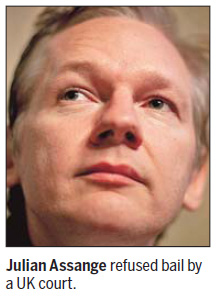Top Stories
WikiLeaks founder arrested in UK
By Michael Holden and Peter apps (China Daily)
Updated: 2010-12-08 08:00
 |
Large Medium Small |

LONDON - WikiLeaks founder Julian Assange handed himself in to British police on Tuesday after Sweden issued a warrant for his arrest over allegations of sex crimes, London's Metropolitan Police said.
Assange, whose WikiLeaks website is at the center of a row over the release of secret US diplomatic cables, was arrested under a European Arrest Warrant.
Swedish prosecutors want to question the 39-year-old Australian about allegations including rape. He denies the allegations.
WikiLeaks, which has provoked fury in Washington with its publications, vowed it would continue making public details of the 250,000 secret US documents it had obtained.
"Today's actions against our editor-in-chief Julian Assange won't affect our operations: We will release more cables tonight as normal," WikiLeaks said, according to its Twitter page.
A British judge on Tuesday denied bail for Assange after he told a London court he intends to fight his extradition to Sweden.
Judge Howard Riddle told Assange that he had "substantial grounds" to believe the Australian wouldn't turn up for subsequent proceedings. He then put Assange into UK custody ahead of an extradition hearing.
Assange has spent much of his time in Sweden and earlier this year he was accused of sexual misconduct by two female Swedish WikiLeaks volunteers.
This led Swedish prosecutors to open, then drop, then re-open an investigation into the allegations. The crime he is suspected of is the least severe of three categories of rape, carrying a maximum of four years in jail.
Assange appeared before City of Westminster Magistrates' Court after turning himself in to Scotland Yard at about 9:30 am GMT (5:30 pm Beijing time) on Tuesday to face a Swedish arrest warrant.
The founder of the secret-spilling website was asked whether he understood that he could consent to be extradited to Sweden, where he faces allegations of rape, molestation and unlawful coercion.
Clearing his throat, Assange said: "I understand that and I do not consent."
Assange's Swedish lawyer has said his client believed foreign powers were influencing Sweden.
The US government and others across the world have argued the publication of cables is irresponsible and could put their national security at risk.
US Attorney General Eric Holder said on Monday President Barack Obama's administration was considering ways to seek prosecutions over their release.
The WikiLeaks website was also shut down after apparent political pressure on service providers, but WikiLeaks said there were now 750 global mirror sites meaning the data so far released remained readily available.
Hero or radical?
A computer hacker with no permanent home, Assange has been described as highly intelligent, determined, intense and sometimes paranoid.
Th Australian has made himself plenty of enemies, from the governments whose secret information he has revealed to former colleagues he has alienated.
Like the WikiLeaks site itself, Assange has proved a divisive figure. Some see him as a hero, challenging censorship and the harbinger of a new age of openness. Others see him as a dangerous radical, wrecking the secretive norms of diplomacy, revealing what should not be revealed.
Whilst preaching the need for official openness, Assange himself is known for being highly secretive. It has been reported that he carries several mobile phones and a rucksack, moving from house to house and staying with friends from Iceland to Kenya.
Born in July 1971 in Townsville on Australia's Queensland coast, Assange has spent his entire life traveling. His parents worked in theater and were often on the road.
In his teens, he gained a reputation as a sophisticated computer programmer before being arrested in 1995 and pleading guilty to hacking. He avoided prison on condition he did not re-offend and in his late 20s went to Melbourne University to study mathematics and physics.
He founded WikiLeaks in 2006, creating a web-based "dead letter drop" for would-be leakers.
Reuters